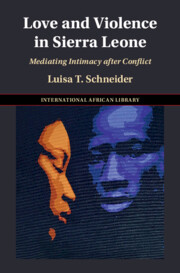Acknowledgements
I thank the many Sierra Leoneans who made this book possible. My heart goes out to their incredible strength and resilience, to the love and warmth with which they strike back when hit by calamities, to the laughter with which they terminate palaver, and to their ability to embrace life with and not despite all its twists and turns. Amongst the many things you taught me, I am most thankful for learning to measure days not in hours but in interpersonal encounters and to be determined to find the ounce of gold in a seemingly endless morass of dirt.
To those who generously shared their life stories and entrusted me with sensitive and often painful aspects of their experiences, I am deeply indebted. I am equally grateful to those who allowed me to accompany them in their daily lives and attend hearings of deeply personal cases, and to those who conversed with me or welcomed my presence within prison walls. I sincerely hope that I have done justice to the faith you placed in me. You are the body and soul of this monograph. Many individuals remain unnamed in these pages due to potential risks associated with revealing their cases, while others have since passed away. My aspiration, however, is that this work will serve as a lasting tribute to your memory.
I thank the extended households at Allentown, Naimbana Street, and 24 for their hospitality and unwavering support. I owe a great debt to Darren, Mr. Mohamed, Aunty Eleanor, Papani, Aunty Kadie, Mariama, Isatu, small Isatu, small Kadie, small Eleanor, Josephus, Aunty Watche, and all EAUC members: thank you!
I am grateful to the Studienstiftung des deutschen Volkes, Oxford University, and the Distinguished Women Scientists Fund (LNVH) for funding fieldwork in Sierra Leone. I am grateful to Russel Martin for his careful editing and his keen eye for detail and to Eugene Jones for checking the Krio and for offering invaluable lessons that had me delve deeper into the etymology of certain words and their spelling. I thank the IAL and, in particular, Stephanie Kitchen and Deborah James for working so deeply with me on this manuscript. Not only did you think with me about framing and content, but you also offered practical support and answered my many questions. I am grateful to three anonymous reviewers for their careful reading and invaluable suggestions. I hope I did your suggestions justice. Any faults are my own.
I thank Hawa-Jane Bangura for her beautiful design of the book’s cover. I am grateful to Ashlee Beazley, Maaike Matelski, and Rebekah King for their continuous emotional and linguistic support. I could not have hoped for better friends! Thank you David Pratten and Ramon Sarró for your academic mentorship and unwavering support. I am furthermore thankful to Elizabeth Ewart and Hélène Neveu Kringelbach for their careful reading of my work and for urging me to publish it. I thank them for their feedback and encouragement with regard to both publishing this work and pursuing academia with open eyes. I would also like to thank Michael Jackson for the brunch that reminded me why I want to continue the way I started and the many emails that meant the world.
Thanks also to those who read drafts of the proposal or chapters, sent resources, or had conversations with me that gave me ideas, including, but not limited to, Andrew Jefferson, Stephen Jensen, Amanda Hammar, Tomas Max Martin, Julienne Weegels, Alice Ievins, Rune Larsen, Bertram Turner, Bethany Schmidt, Anastasiia Omelianiuk, and Robbert Dillema. I am furthermore grateful to Freek Colombijn, Ellen Bal, and Marina de Regt for their academic friendship and support.
Thank you to Andrew Jefferson, Lotte Baelum Mortensen, and Amanda Hammar for opening their doors and sharing their homes with me and for making me feel like I belong when I had nowhere to turn. Thank you to DIGNITY, the Danish Institute Against Torture, and the Center for African Studies in Copenhagen for having me as a fellow and providing a simultaneously calm and stimulating environment to progress with my writing. I thank my colleagues at the Max Planck Institute for Social Anthropology for providing the space and support necessary to complete this work and for supporting its publication emotionally and financially. I am grateful to the Department of Law and Anthropology under Marie-Claire Foblets, which generously financed the Open Access publication of this work. Thank you to the Anthropology Department at Vrije Universiteit Amsterdam for providing an academic home and for supporting the final steps of this manuscript. Furthermore, I am grateful to the editors and publishers of articles where I first explored some of the ideas that have been more fully developed in this monograph. For further details, please refer to the following publications:
I am grateful to Marcin, Micha, Mailee, Laura, Rune, Lisa, Anna, Hanneke, and Youri for their love, feedback, and encouragement. Thank you for always bringing the sun back into my life and for helping me find my way after I got lost. To my parents, Karin and Roland, who never cease to inspire me: if I did it, I did it because of how you raised me!
I thank my family and loved ones for much more than words can contain.
